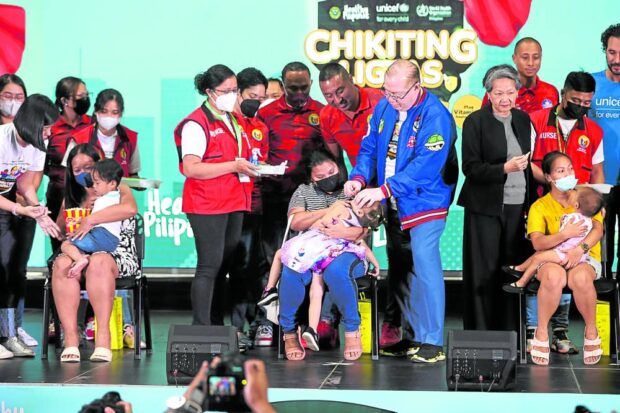
‘CHIKITING LIGTAS’ Small children are vaccinated against measles at the launch of the “Chikiting Ligtas (safe little ones)” immunization drive in San Juan City. INQUIRER/NIÑO JESUS ORBETA
The number of children receiving a second dose of measles vaccines has steadily declined in the last three years, with the Philippines failing to meet even half of the target population in the first nine months of 2023, according to the Department of Health (DOH).
Based on DOH figures released on Friday, the percentage of infants and toddlers 5 to 59 months old who received the complete two doses of measles vaccines reached 73.2 percent in 2020.
But this dropped to 68.5 percent in 2021 and 65.4 percent in 2022.
The immunization coverage further slowed this year to 45.5 percent, based on data from January to September.
“All sectors and units of government should work together, focusing on our children, using primary health care as a platform to reach and vaccinate every missed child,” the DOH said in a statement.
The three-year COVID-19 health crisis reversed the gains made in the immunization program against measles and other infectious diseases usually afflicting children.
Before the pandemic, inoculation rates for the second dose against measles were on an upward trend. In 2018, coverage was at 58.7 percent, then 69.2 percent in 2019, and 73.2 percent in the first year of the pandemic.
A supplemental immunization activity was conducted nationwide from May to June this year, but it fell short in meeting the target of at least 90 percent of the 9.5 million children who were expected to get the shots.
The special inoculation drive, dubbed “Chikiting Ligtas,” reached only around 8 million, or 84 percent of the target.
RELATED STORIES
DOH: Only 80% of PH kids vaccinated vs measles, polio
COVID’s other harm: War on polio, measles slows